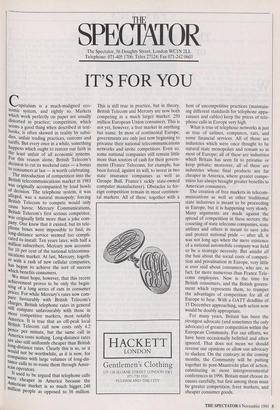SPECTAT T OR
The Spectator, 56 Doughty Street, London WC1N 2LL Telephone: 071-405 1706; Telex 27124; Fax 071-242 0603
IT'S FOR YOU
Capitalism is a much-maligned eco- nomic system, and rightly so. Markets Which work perfectly on paper are usually distorted in practice; competition, which seems a good thing when described in text- books, is often skewed in reality by subsi- dies, unfair trading practices, customs and tariffs. But every once in a while, something happens which ought to restore our faith in the least unfair of all economic systems. For this reason alone, British Telecom's decision to cut its weekend rates — a bonus to consumers at last — is worth celebrating.
The introduction of competition into the British telecommunications market in 1983 Was originally accompanied by loud howls Of derision. The telephone system, it was alleged, was a natural monopoly; forcing British Telecom to compete would only cause havoc. Mercury Communications, British Telecom's first serious competitor, was originally little more than a joke com- Pally. One knew that it existed, but its tele- Phone boxes were impossible to find, its Icing-distance service seemed too compli- cated to install. Ten years later, with half a million subscribers, Mercury now accounts for 10 per cent of the national telecommu- nications market. At last, Mercury, togeth- er with a rash of new cellular companies, has begun to achieve the sort of success Which benefits consumers. We must hope, however, that this recent achievement proves to be only the begin- ning of a long series of cuts in consumer Prices. For while Mercury's rates now com- pare favourably with British Telecom's charges, British telephone rates in general still compare unfavourably with those in Tore . competitive markets, most notably Ainerica. It is true that an off-peak local British Telecom call now costs only 4.2 Pence. per minute, but the same call in America costs nothing. Long-distance rates .are also still uniformly cheaper than British 1°11g-distance rates. Clearly this is so, or it would not be worthwhile, as it is now, for .eninpanies with large volumes of long-dis- .iance calls to re-route them through Amer- ican operators.
It used to be argued that telephone calls Were . cheaper in America because the Arnencan market is so much bigger, 240 million people as opposed to 56 million. This is still true in practice, but in theory, British Telecom and Mercury are now both competing in a much larger market: 250 million European Union consumers. This is not yet, however, a free market in anything but name. In most of continental Europe, governments are only just now beginning to privatise their national telecommunications networks and invite competitors. Even so, some national companies still remain little more than sources of cash for their govern- ments (France Telecoms, for example, has been forced, against its will, to invest in two state insurance companies as well as Groupe Bull, France's sickly state-owned computer manufacturer). Obstacles to for- eign competition remain in most continen- tal markets. All of these, together with a host of uncompetitive practices (maintain- ing different standards for telephone appa- ratuses and cables) keep the prices of tele- phone calls in Europe very high.
What is true of telephone networks is just as true of airlines, computers, cars, and some financial services. All of these are industries which were once thought to be natural state monopolies and remain so in most of Europe; all of these are industries which Britain has seen fit to privatise or keep private; moreover, all of these are industries whose final products are far cheaper in America, where greater compe- tition has always brought greater benefits to American consumers.
The creation of free markets in telecom- munications as well as other traditional state industries is meant to be proceeding in Europe, but it is happening very slowly. Many arguments are made against the spread of competition in these sectors: the cosseting of state telecoms companies, state airlines and others is meant to save jobs and protect national pride — after all, it was not long ago when the mere existence of a national automobile company was held to be a strategic necessity. But amidst all the fuss about the social costs of competi- tion and privatisation in Europe, very little is ever said about consumers, who are, in fact, far more numerous than France Tele- coms employees. Now is the time for British consumers, and the British govern- ment which represents them, to trumpet the advantages of competition for all of Europe to hear. With a GATT deadline of 15 December approaching, such action now would be doubly appropriate.
For many years, Britain has been the strongest advocate (and sometimes the only advocate) of greater competition within the European Community. For our efforts, we have been occasionally belittled and often ignored. That does not mean we should reverse our opinions or allow our advocacy to slacken. On the contrary: in the coming months, the Community will be putting together its post-Maastricht plan of action, culminating in more intergovernmental conferences in 1996. Britain must choose its causes carefully, but first among them must be greater competition, freer markets, and cheaper consumer goods.










































































 Previous page
Previous page